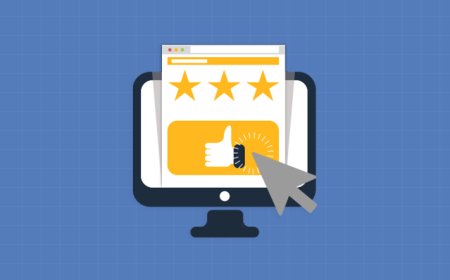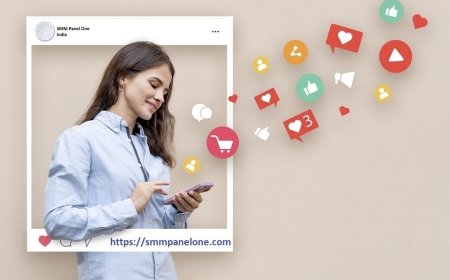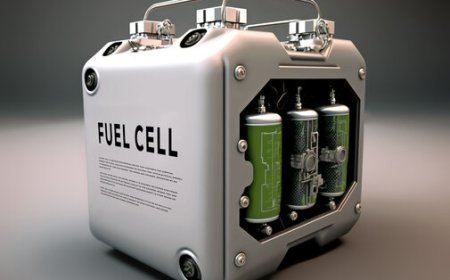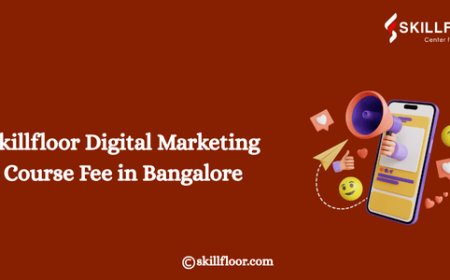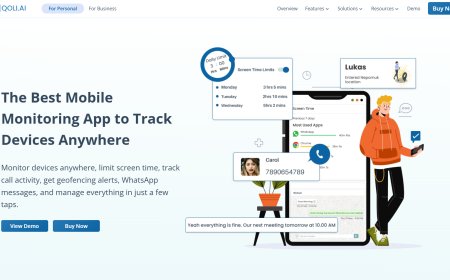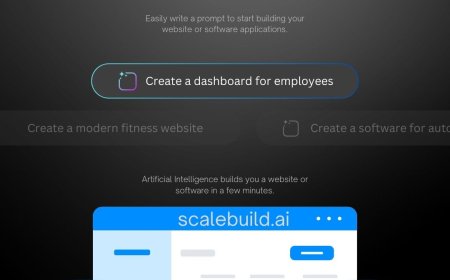How to Choose the Right AI Chatbot Development Services for Your Business?
Choosing the right AI chatbot development services for your business involves evaluating technical expertise, industry experience, customization capabilities, and integration support. This guide helps you identify the key factors to consider when selecting a development partner to ensure your chatbot aligns with your business goals and delivers maximum ROI.

The demand for AI-powered chatbots has surged as businesses across industries embrace automation, personalization, and 24/7 customer support. From lead generation and customer service to e-commerce assistance and internal operations, AI chatbots are revolutionizing how companies engage with customers and employees alike.
However, the success of an AI chatbot doesnt just depend on the technologyit heavily relies on choosing the right development services partner. A poorly developed chatbot can frustrate users, hurt your brand reputation, and waste resources. On the other hand, a well-planned and skillfully executed chatbot can enhance customer experience, reduce costs, and boost operational efficiency.
So how do you choose the right AI chatbot development services for your business? In this blog, well walk you through the essential criteria, questions to ask, and pitfalls to avoid when selecting your chatbot development partner.
1. Define Your Business Goals
Before approaching a chatbot development provider, you need to be clear about why you want a chatbot and what you hope to achieve. Your goals will guide the type of chatbot you need and the capabilities it must offer.
Common Business Goals:
-
Automate customer support
-
Generate and qualify leads
-
Provide product recommendations
-
Assist with internal helpdesk tasks
-
Improve response times and reduce support costs
Action Step: Create a list of use cases and expected outcomes. These will help you evaluate potential vendors and communicate your vision clearly.
2. Evaluate Technical Expertise
A reliable AI chatbot development company should have proven expertise in artificial intelligence, natural language processing (NLP), machine learning (ML), and cloud-based architecture. Assess their technical strengths and understanding of chatbot frameworks.
What to Look For:
-
Experience with platforms like Dialogflow, Rasa, IBM Watson, Microsoft Bot Framework, GPT-based models
-
Ability to build NLP-based conversational flows
-
Custom AI model training capabilities
-
Integration experience with third-party platforms (CRMs, ERPs, e-commerce systems)
Tip: Ask for a technical walkthrough or demo of a previous chatbot theyve built to gauge their capabilities.
3. Check Industry Experience
Industry knowledge is a major advantage when selecting a chatbot development service. A provider familiar with your sector is more likely to understand your customers, compliance requirements, and common use cases.
Questions to Ask:
-
Have you worked with companies in our industry?
-
Can you share relevant case studies or client references?
-
What specific problems have you solved for businesses like ours?
Why It Matters: Industry-experienced providers can often offer pre-built components, workflows, or integrations that reduce development time and cost.
4. Assess Customization Capabilities
Your chatbot should align with your brand personality, customer expectations, and business processes. Avoid providers that rely solely on templates or offer limited customization.
Key Customization Areas:
-
Tone of voice and conversation style
-
Multi-language and regional support
-
Branded visuals, UI components, and avatars
-
Custom workflows and escalation paths
Look For: A provider who tailors every chatbot to fit the unique needs of the business instead of using cookie-cutter solutions.
5. Review Integration Support
An effective AI chatbot must integrate seamlessly with your existing systemsbe it your CRM, helpdesk, e-commerce platform, or internal database.
Common Integrations:
-
Salesforce, HubSpot, Zoho (CRM)
-
Zendesk, Freshdesk (Helpdesk)
-
Shopify, WooCommerce (E-commerce)
-
Calendly, Google Calendar (Scheduling)
-
Payment gateways (Stripe, Razorpay, etc.)
Red Flag: Avoid providers who require excessive manual setup or have limited integration experience.
6. Prioritize Omnichannel Deployment
Customers interact with businesses across multiple channelsyour website, mobile app, WhatsApp, Facebook Messenger, and more. The right development partner should support multi-channel chatbot deployment for consistent customer experiences.
Ask About:
-
Cross-platform compatibility
-
Unified backend dashboard
-
Consistent conversation flow and handover mechanisms
Bonus: Choose a provider that can future-proof your chatbot with emerging channels like voice assistants (Alexa, Google Assistant) or AR/VR integrations.
7. Inquire About Scalability and Maintenance
Your business will growand so should your chatbot. Ask your provider how scalable their solution is and whether they offer ongoing support and maintenance post-deployment.
Must-Haves:
-
Scalable cloud architecture
-
Support for expanding user base and features
-
Regular performance monitoring and updates
-
Bug fixes, training, and content optimization
Support Model: Ensure they offer service-level agreements (SLAs), timely updates, and access to a support team.
8. Analyze UX and Conversation Design Skills
A chatbot is only as good as its user experience. Poorly designed bots that confuse or frustrate users can do more harm than good. Choose a partner that emphasizes UX and conversation design.
What to Expect:
-
Structured, intuitive conversation flows
-
Proper error handling and fallback mechanisms
-
Human handover for complex queries
-
Continuous testing for user engagement
Pro Tip: Ask to see sample conversation maps or scripts from previous projects.
9. Understand Their Approach to Analytics and Insights
The value of a chatbot doesnt stop at automation. Its a powerful tool for capturing customer insights that inform product development, marketing strategies, and support improvements.
Key Analytics Features:
-
Interaction volume and engagement rates
-
User satisfaction and feedback collection
-
Abandonment or drop-off tracking
-
Conversation performance reports
Outcome: Choose a provider who includes analytics dashboards or integrates with tools like Google Analytics, Mixpanel, or Power BI.
10. Evaluate Security and Compliance Standards
When handling sensitive customer data, especially in industries like finance, healthcare, or insurance, security and compliance are critical.
Security Best Practices:
-
End-to-end encryption of conversations
-
GDPR, HIPAA, or other relevant regulatory compliance
-
Secure API usage and role-based access control
-
Regular security audits and vulnerability assessments
Be Sure To Ask: How do you store, process, and secure user data?
11. Compare Pricing and Delivery Timelines
AI chatbot development services vary widely in cost. While it's tempting to go for the lowest quote, be sure to balance cost with capability.
Pricing Models to Consider:
-
Fixed project cost
-
Monthly subscription (SaaS)
-
Pay-per-conversation or user-based pricing
-
Custom enterprise packages
Time to Market: Ask about project timelines, milestone delivery, and whats included in the scope to avoid hidden costs.
12. Look for a Collaborative Development Process
The best chatbot projects are the result of collaboration between the business and development team. Choose a provider who encourages open communication, feedback loops, and iterative development.
Preferred Practices:
-
Agile or sprint-based development
-
Dedicated project manager
-
Transparent communication channels (Slack, Zoom, etc.)
-
Milestone-based reviews and approvals
Tip: Avoid one-size-fits-all vendors who dont involve you during the creative and testing phases.
Final Thoughts
Choosing the right AI chatbot development services is a critical step toward digital transformation and delivering superior customer experiences. With so many options in the market, its essential to evaluate each provider based on technical capabilities, industry relevance, customization potential, integration ease, support structure, and long-term scalability.
Remember, your chatbot is an extension of your brand. Selecting the right partner ensures it functions effectively, evolves with your needs, and delivers lasting value.

